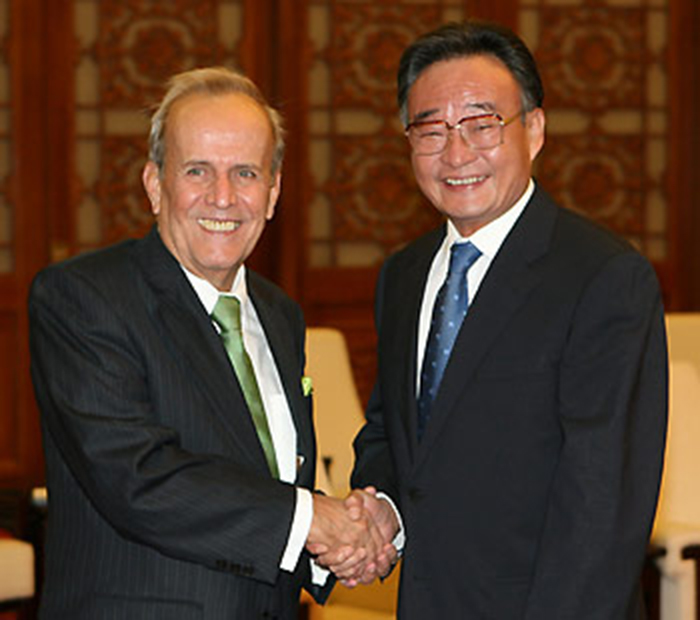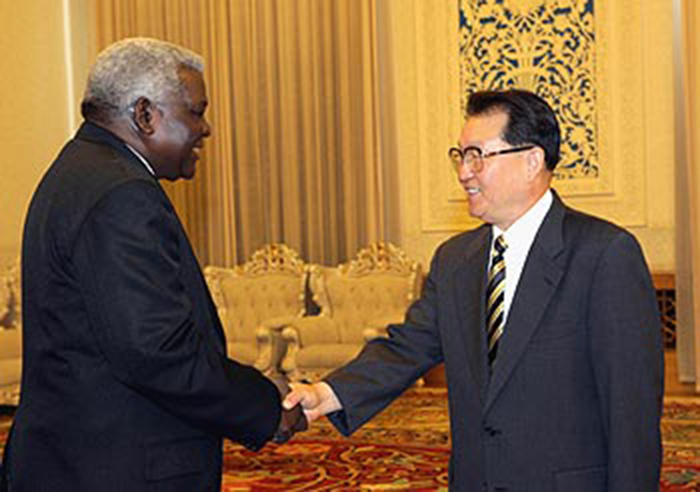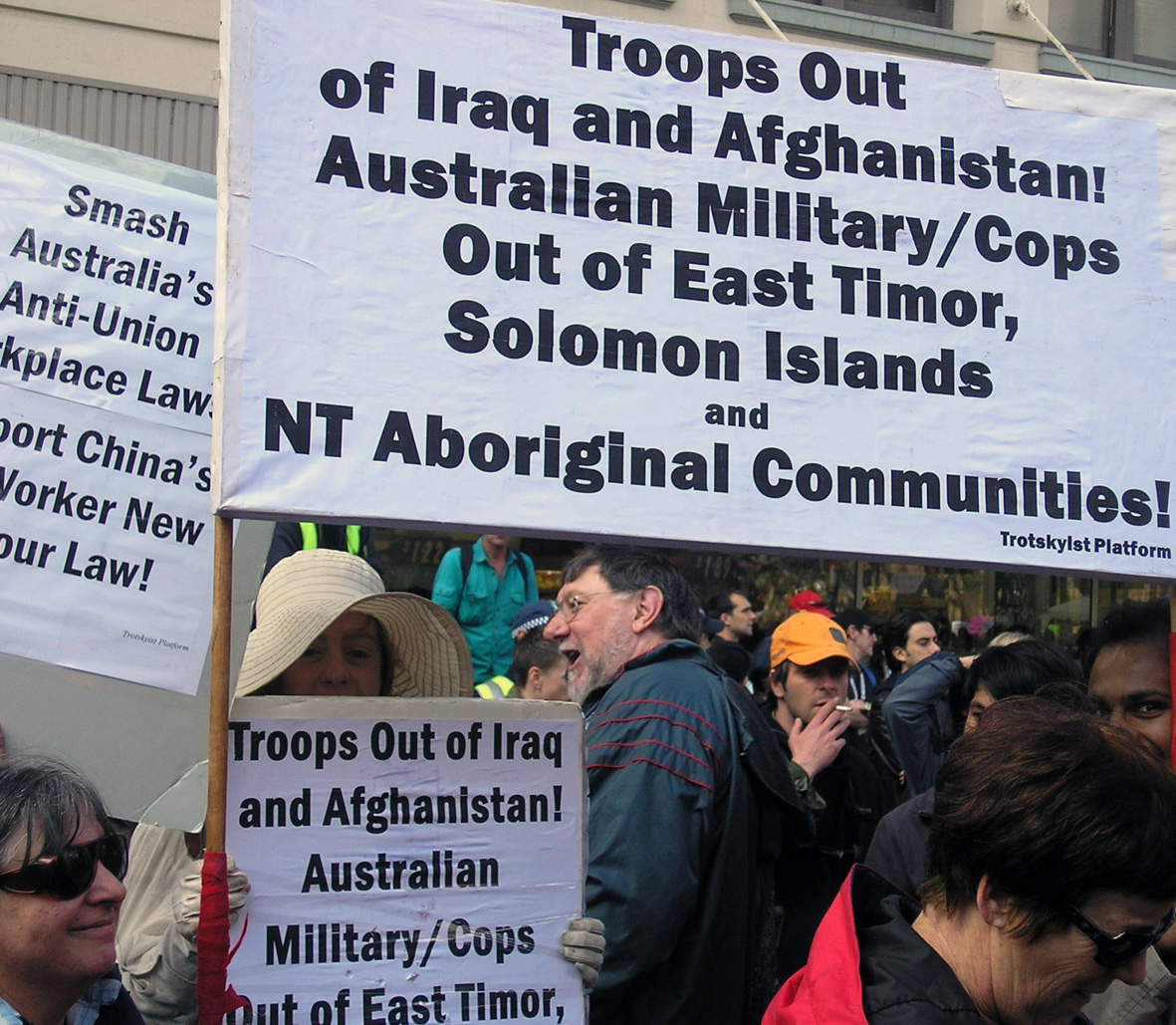
Friendly relations between China and Cuba are now at a historical height, said China’s top legislator Wu Bangguo at a meeting last June with his Cuban counterpart Ricardo Alarcon, president of the Cuban National Assembly of People’s Power. Alarcon and the Cuban Communist Party were visiting China at the invitation of the Communist Party of China. Importantly, Wu who is chairman of the Standing Committee of China’s National Peoples Congress promised that China would back Cuba in safeguarding national sovereignty and opposing external intervention (Xinhua, 4 June 2007). This is effectively a statement proclaiming that the Peoples Republic of China (PRC) would defend Cuba against an attack from U.S. imperialism.
Ever since capitalism was overthrown in Cuba and that country was freed from neocolonial slavery, the U.S. ruling class has sought to foment capitalist counterrevolution there. Economic and military backing by the former USSR, including a promise to stand by Cuba in case of imperialist invasion, staved off a full scale American military assault and allowed Cuba to build up its strength despite decades of U.S. provocation and blockade. Cuba therefore has a greater internal capacity to resist an imperialist assault than it did four decades ago but the loss of Soviet support was a terrible blow that makes the Cuban revolution much more vulnerable. The strengthening of Cuba’s relations with Red China heralds the emergence of a new deterrent to U.S. attack.
The solidification of the alliance between the Cuban and Chinese workers states has significance for the political direction in those countries themselves. Like its former Soviet counterparts from Stalin on, the Chinese Communist Party leadership, distorted by nationalism and bureaucratic egotism, has often subordinated the international struggle for socialism to its own country’s perceived “national interests.” In the late 1950s this short-sighted outlook from both the Soviet and PRC leaders led to a split between the two Red giants that scorched great damage to the anti-capitalist cause. In the early 1970s things went further downhill when the Chinese leadership signed a treacherous deal with the U.S. against the Soviet Union. This alliance would contribute to the eventual destruction of the Soviet Union that has in turn magnified the capitalist pressures bearing down upon the PRC. The proclamation of the U.S.-China anti-Soviet alliance was not long after followed by a rightward slide within China itself under Deng Xiaoping and the PRC’s creep away from any solidarity with pro-working class struggles outside its lands. But today with Red China the main ultimate target (notwithstanding the U.S.’s current pre-occupation with the anti-Muslim “war on terror”) of imperialist hostility, those PRC leaders who have even a half-hearted commitment to communism cannot but understand that they must strengthen China’s ties with the other remaining workers states. Furthermore, the PRC has importantly started, albeit in a very small way, to show solidarity with pro-socialist campaigns in the capitalist world. In November 2006, the Communist Party of China joined other Marxist parties around the world in voting for a resolution declaring full solidarity with the Communist Youth Union in the Czech Republic in the face of that group’s dissolution by the right-wing Czech government. Such laudable acts of solidarity must be greatly deepened. In the long term, workers states cannot be preserved neither in the biggest country in the world nor in tiny Cuba without the development (and eventual triumph) of the class struggle in the rest of the world. The PRC policy traditions that must be built on include China’s heroic defence of North Korea from capitalism during the Korean War and the Peoples Republic’s support for the Vietnamese revolutionary struggle in its early days. Today, the PRC’s stated commitment to defend embattled Cuba is a step in the correct direction.
The non-capitalist social systems in Cuba and China are both also the target of Western-funded anti-communist exile political groups. The Cuban counterrevolutionaries are based in Miami, the Chinese ones in different places around the world and include the unrepentant offspring of the overthrown former landlords, gangsters and capitalists. Both sets of capitalist restorationists brandish religion for their cause. The Cuban counterrevolutionaries often stand on Catholicism while among the most prominent anti-PRC forces is the Falun Gong, a pseudo-religious outfit that espouses right-wing social and crackpot homophobic values. Of course, all the anti-communist forces march under the flag of “democratic rights” by which they mean the right to establish a social system that will allow the few to exploit the many.
The degree of imperialist political pressure on both Cuba and China is intense. Washington has its own government office promoting counterrevolution in Havana while it attempts similar aims in China by backing “democratic” movements amongst the upper middle class of Hong Kong. Then there are the U.S. radio stations broadcasting anti-communist propaganda: Radio/TV Marti beaming into Cuba and Radio Free Asia into China, Vietnam, North Korea and Laos. It is notable that both radio stations operate under the same American agency, the Broadcasting Board of Governors (BBG).
Rightly enough, there is considerable support for the Cuban Revolution amongst leftists in the West. Unfortunately, that same solidarity does not yet exist for the PRC. Why? In part this is because particular policies of Beijing have made the PRC seem a less attractive model to leftists around the world. Firstly, there was the former Beijing–Washington anti-Soviet alliance. Secondly, the post-1978 “market reforms” that the PRC leadership has embarked on has led to greater inequality in China as compared to Cuba. However, there was a time when the Chinese Revolution was inspirational for anti-capitalist and anti-racist activists in the West. In this country, for example, some Aboriginal activists in the 1970s took the PRC’s renowned “barefoot doctors” schemes as a model for the successful public health system they needed here.
One should not forget when trying to differentiate between China and Cuba what an especially difficult task that the Chinese Communists have faced in trying with great effort to lift up a diverse, geographically harsh and historically burdened country with 1300 million residents. Today, the now accelerating moves to rebuild public housing, public health care and public education in the PRC speak to the enduring gains of China’s 1949 revolution despite the dangerously corrosive effects that partial capitalist economic penetration has caused. Speaking during his June 2007 meeting with his Chinese counterpart, Cuban legislative leader Ricardo Alarcon stressed that China’s achievements, including fast economic growth, improvements of living standards and growing international prestige are vivid indications of the vitality of the socialist system.

The much lower level of solidarity given to the PRC by the Western left as compared to that which is rightly given to Cuba has probably more to do with the left in these countries than with the problems in China itself. You see, for socialists living in the imperialist countries there is much more social pressure to stand up to if one defends the Chinese “Communist giant” than when one supports embattled Cuba. As it is by far the biggest workers state and one with a successfully expanding economy to boot, it is the Peoples Republic of China that is the subject of the deepest anti-communist fears of the capitalist exploiters and of the comfortable layers of the middle class in the Western world.
The questions of Cuba and China also play out quite differently in the U.S. than they do in Australia. Cuba is the closest workers state to the U.S. and there is a big right-wing Cuban exile community in the U.S. too. Therefore the Cuban workers state like the Chinese one is the subject of intense American ruling class hostility. But from the vantage point of Australia Cuba is far away and there is not much of an anti-communist Cuban exile layer here. Instead, here it is the Asian workers states that are geographically the closest and there are indeed significant ethnic Chinese and Vietnamese anti-communist populations. In Australia mainstream media propaganda and rightwing talkback radio do not focus much on Cuba but mainly target China and North Korea. In this white racist country anti-communist hostility to Red China has also always mixed in with “yellow peril” fears about big Asian countries or its softer variant, paternalistic notions about the superiority of “fair go Aussie values” over those of the people in the near north. Accommodating to these considerable social pressures, many of the Australian Marxist groups that solidarise with Cuba march in the opposite direction when it comes to the Peoples Republic of China. However, if counterrevolution were to engulf China, not only would it be catastrophic for the Chinese masses but it would also make capitalist exploiters the world over feel more pumped up and arrogant.
Just as workers must defend their trade union from the capitalists no matter how much a particular union leadership may cut rotten deals with greedy bosses, the working class must defend the Cuban, Vietnamese, Chinese and North Korean workers states against counterrevolutionary forces, no matter how bad the policies the states’ leaderships may sometimes implement. And just as worker activists here would with extra vigour stand by a union that is being particularly besieged by the capitalists and is being especially slandered in the media, they must with special energy devote themselves to defending the targeted workers states here in Asia. ♦
RETURN TO FRONT PAGE





E-mail: trotskyistplatform@gmail.com
Phone (Australia): 0417 204 611
Phone (International):0061 417 204 611
